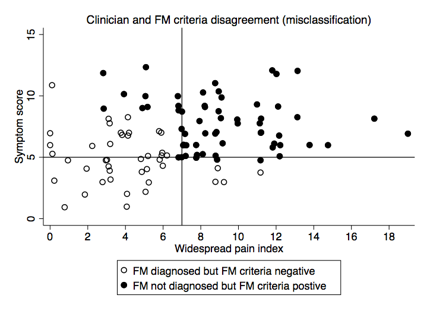Session Information
Date: Monday, October 22, 2018
Title: 4M082 ACR Abstract: Fibromyalgia & Other Clinical Pain Syndromes (1834–1839)
Session Type: ACR Concurrent Abstract Session
Session Time: 2:30PM-4:00PM
Background/Purpose: Recent studies have suggested that fibromyalgia is inaccurately diagnosed in the community, and that approximately 75% of persons reporting a physician diagnosis of fibromyalgia would not satisfy published criteria. To investigate possible misclassification, we studied fibromyalgia diagnosis by comparing expert physician diagnosis with published criteria.
Methods: In a university rheumatology clinic, 497 consecutive unselected patients completed the Multi-dimensional Health Assessment Questionnaire (MDHAQ) as well as the 2010 American College of Rheumatology (ACR) preliminary diagnostic criteria for fibromyalgia questionnaire (FCQ) modified for self-administration during their ordinary medical visit. Patents were evaluated and diagnosed by university rheumatology staff who did not review the FCQ.
Results: Of the 497 patients, 121 (24.3%) satisfied fibromyalgia criteria while 104 (20.9%) received a clinician ICD diagnosis of fibromyalgia. The overall agreement between clinicians and criteria was 79.2%. However, agreement beyond chance was only fair: kappa 0.41 [probabilistic category 0.20 -0.40]. Physicians failed to identify 60 (49.6%) of criteria positive patients and incorrectly identified 43 (11.4%) of criteria negative patients as shown in Figure 1.
As shown in Figure 2, clinician diagnosed case varied widely in PSD scores, while criteria positive cases and criteria and clinician negative cases had appropriate PSD scores.
Because there were approximately 4 times as many clinical fibromyalgia negative patients, the total counts of positive and negative misclassifications (60 vs. 43) were closer than the percentages suggested. In a subset of 88 patients with rheumatoid arthritis, the kappa statistic was 0.32, indicating slight to fair agreement [0.00-0.20]. Universally, higher PSD scores and criteria based diagnosis were associated with more abnormal MDHAQ clinical scores. Women, patients with more symptoms but fewer pain areas, and those with lower polysymptomatic distress (PSD scores were more likely to receive a clinicianÕs diagnosis than to satisfy fibromyalgia criteria.
Conclusion: There is considerable disagreement between clinical diagnosis as recorded in ICD codes and criteria determined diagnosis of fibromyalgia, confirming diagnostic problems found in the community and calling into question ICD based fibromyalgia studies. Fibromyalgia criteria were easy to use, but problems regarding clinician bias, meaning of a fibromyalgia diagnosis, and the validity of physician diagnosis were substantial.
To cite this abstract in AMA style:
Srinivasan S, Schmukler J, Jamal S, Castrejón I, Gibson KA, Häuser W, Pincus T, Wolfe F. Diagnosis of Fibromyalgia: Disagreement between Fibromyalgia Criteria and Clinician-Based Fibromyalgia Diagnosis in a University Clinic [abstract]. Arthritis Rheumatol. 2018; 70 (suppl 9). https://acrabstracts.org/abstract/diagnosis-of-fibromyalgia-disagreement-between-fibromyalgia-criteria-and-clinician-based-fibromyalgia-diagnosis-in-a-university-clinic/. Accessed .« Back to 2018 ACR/ARHP Annual Meeting
ACR Meeting Abstracts - https://acrabstracts.org/abstract/diagnosis-of-fibromyalgia-disagreement-between-fibromyalgia-criteria-and-clinician-based-fibromyalgia-diagnosis-in-a-university-clinic/


